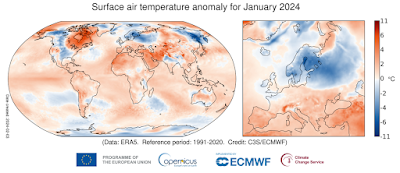A Tumultuous Climate Trajectory
The recent data paints a grim picture of our climate's trajectory, with January 2024 marking the eighth consecutive month of unprecedented atmospheric temperature records across both land and sea. Furthermore, it signifies the twelfth consecutive month where average global surface temperatures have alarmingly exceeded the 1.5 degrees Celsius threshold above pre-industrial averages. This threshold, as outlined by scientists, represents a critical limit to forestall the most irreversible impacts of climate change.
Understanding the Pre-Industrial Baseline
To grasp the significance of these records, it's essential to understand what the "pre-industrial average" entails. This term refers to the global climate baseline, calculated from average temperatures recorded between 1850 and 1900. Despite the onset of warming due to fossil fuel emissions during this period, it serves as a reference point due to the scarcity of reliable scientific data prior. Currently, the long-term average temperature increase stands at approximately +1.25°C from the pre-industrial era, highlighting a concerning upward trend.
 |
The Underestimated Warming
Recent revelations suggest that the extent of global warming may have been underestimated. A study published in Nature Climate Change, utilizing temperature data derived from ancient sponges, proposes that actual warming could exceed previous estimates by up to 0.5°C. This finding implies that the planet may have crossed the +1.5°C threshold as early as 2010, a conclusion met with varying degrees of acceptance within the scientific community.
Accelerated Warming: Causes and Consequences
The acceleration of global warming is an undeniable reality, fueled by rampant greenhouse gas emissions. However, the extraordinary temperature records of the past year can also be attributed to factors such as the El Niño phenomenon, the recent eruption of the Tonga volcano, and changes in atmospheric aerosol concentrations. Despite these contributing elements, it's unequivocally clear that the reduction of anthropogenic greenhouse gas emissions remains our most potent tool in halting this alarming rise in temperatures.
The Path Forward
As we navigate through these unprecedented times, the need for immediate and decisive action against climate change has never been more apparent. Through freeastroscience.com, we aim to demystify these complex scientific concepts and foster a community that's not only informed but also motivated to advocate for sustainable solutions. The journey toward a cooler planet is a collective one, and together, we can turn the tide against global warming.
In conclusion, the record-breaking temperatures of January 2024 serve as a clarion call for humanity. It's a reminder of the urgent need to address the root causes of climate change, to safeguard our planet for future generations. Stay tuned to freeastroscience.com for more insights and updates on this critical global challenge.


Post a Comment